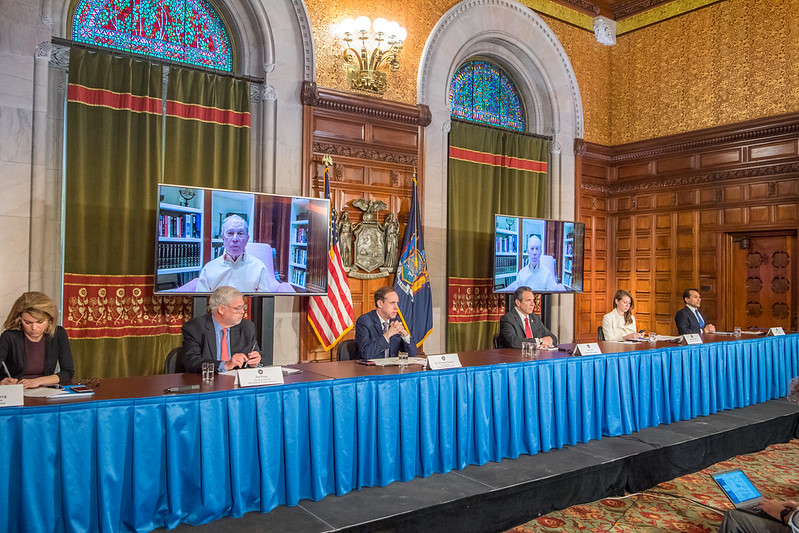
Bloomberg and Cuomo team up on contact tracing (photo: Darren McGee/Governor's Office)
The scene sounds familiar: Michael Bloomberg overseeing thousands of officials tracking where New Yorkers go and who they spend time with, all in the name of keeping us safe. In 2010, it was then-Mayor Bloomberg overseeing tens-of-thousands of NYPD officers as they stopped and frisked New Yorkers of color and spied on Muslim student groups and mosques. In 2020, it’s Bloomberg the philanthropist, helping to run the unprecedented effort to contact-trace the spread of COVID-19.
There’s a lot we don’t know about the state’s contact-tracing partnership with Bloomberg: who will have access to the data, how will data be kept, when (if ever) can data be shared with police. But there is a lot we do know about Bloomberg, facts that should give us pause about entrusting the most important public health effort in generations to the man who thought American Samoa’s presidential delegates were worth nearly $200 million.
Throughout his time as Mayor and short-lived presidential run, Bloomberg was a self-proclaimed stats guy, the man famous for saying: “In God we trust, all else bring data.” But for Bloomberg, data has a dangerous way of showing him what he already believes. Bloomberg views statistics with a Wall Street hubris, the mindset of the financial titans who assure us that they know exactly how to manage risk up until the moment everything crashes and they ask for the next bailout.
The truth is that data about human beings is almost inevitably biased, warped by countless subjective decisions that go into creating the data set. In finance, it was the logic of redlining that decided black homeowners were too risky to lend to, thereby depriving them of loans, and creating the self-fulfilling prophecy where many capital-starved black neighborhoods then saw higher rates of foreclosure after they were forced to turn to predatory lenders. It was the logic of stop-and-frisk, the racist policing practice that Bloomberg defended until the precipice of his presidential campaign, claiming “we put all the cops in minority neighborhoods. Yes, that’s true. Why do we do it? Because that’s where all the crime is.”
The problem is that communities of color weren’t the only place that “crime was,” it was just the only place where many laws were enforced. Looking back at my own lower Manhattan childhood, the reality is stark. Whether it was open container violations, drug possession, or other low-level offenses, we had these in abundance in wealthy white neighborhoods. The only difference is that no one was stopped for them, and thus the crime data showed they weren’t happening.
History is why so many New Yorkers want safeguards and answers before the Bloomberg partnership goes forward. At a time when the cash-strapped state is digging beneath the proverbial couch cushions for every spare penny, having Bloomberg finance the tracking program will come as a financial relief. But for contact tracing to be effective, Albany will need something more elusive than even Bloomberg’s billions: public trust.
Without public trust, without our willingness to hand over the most intimate details of our lives to a complete stranger, contact tracing will hit a dead end. Our ability to track disease is only as strong as the public’s ability to help. But rather than bending over backwards to reassure New York’s most vulnerable and potentially reluctant residents, the state’s leaders are dismissing the concerns out of hand.
When Public Advocate Jumaane Williams sent a letter to Governor Cuomo, asking for reassurances about Bloomberg’s role in the tracking program, the response was less than receptive. Rather than giving the city’s top civil rights watchdog the details requested, Cuomo’s spokesperson dodged most of his requests before saying “There’s enough real problems fighting this pandemic, and we have no time for politicians who create fake ones in a craven attempt to get in the paper.”
But that’s precisely the problem: privacy is already a part of the fight against the pandemic. If the Governor can’t give a clear and direct response to questions like, “who has access to the data,” then how can New Yorkers be expected to provide that data in the first place?
Throughout the COVID crisis, the Governor has doubled down on his impulse to act unilaterally. Some of those decisions have helped safeguard the state, but others have likely cost us lives and wasted millions (if not billions) in public funds. But this is a part of the COVID battle that Cuomo can’t fight on his own. A trusted, inclusive, culturally-competent contact-tracing system will require unprecedented public support.
If we go forward with Bloomberg at the center of the effort, then it will put even more pressure on state leaders to win the public’s trust. If we disclose all the details possible, create the strongest privacy safeguards in the country, and have a sustained public engagement campaign, then this might all just work. But if we don’t act now to prove to the public why this scheme is safe, then not even Bloomberg’s checkbook will be enough to erase his checkered privacy past.
***
Albert Fox Cahn is the executive director of The Surveillance Technology Oversight Project at the Urban Justice Center, a New York-based civil rights and privacy organization. He writes the monthly "Surveillance and the City" column for Gotham Gazette. On Twitter @FoxCahn.
***
Have an op-ed idea or submission for Gotham Gazette? Email This email address is being protected from spambots. You need JavaScript enabled to view it.




